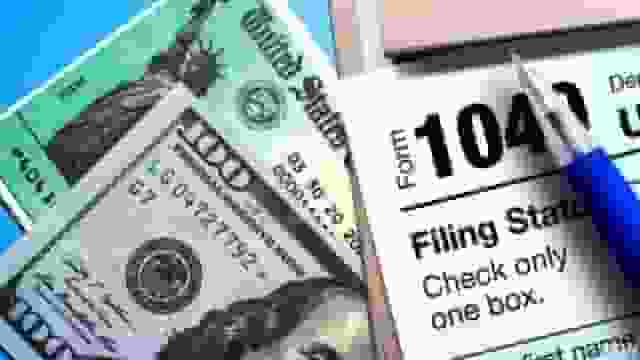Democrats have abandoned their plans to tax people and businesses more heavily in favour of a corporate minimum tax and greater enforcement of existing regulations.
But merely suggesting that the Internal Revenue Service take action against tax evasion has drawn a vehement Republican backlash.
Sen. Rick Scott (R-Fla.) told HuffPost that “they’re just going to go target every small business guy.” “We are aware of how the IRS treats its citizens. Until you are found innocent, you are guilty.
The Inflation Reduction Act would increase the IRS budget by $80 billion, with more than half of that amount going toward enforcement and $3 billion of it going toward better customer service.
Democrats are hoping to pass the bill through the Senate this month without the support of Republicans.
Sen. John Thune (R-S.D.) noted on the Senate floor on Tuesday that this agency “only succeeded in responding roughly one out of every 50 phone calls during the 2021 tax season.”
“Yet only 4% of the $80 billion is going to taxpayer services; 57% goes to enforcement, allowing the IRS to harass taxpayers all around the country more frequently.”
The American people collectively underpay their taxes by hundreds of billions of dollars per year, and the United States depends on voluntary compliance with its tax code.
People who underreport non-wage income, such as that from sole proprietorships or business partnerships, are mostly to blame for the so-called tax gap.
Federal income taxes are routinely withheld from regular wage earners’ paychecks and their income is reported to the IRS directly.
As a result of a large amount of tax evasion, particularly willful avoidance, tighter IRS enforcement more than compensates for itself.
According to the Congressional Budget Office, investing $80 billion in the IRS would result in $207 billion in revenue over ten years.

Making people pay taxes they already owe is the same as raising their taxes, according to Sen. Mike Crapo (R-Idaho), the ranking Republican on the Senate tax committee.
Additionally, he claimed in a press release this week that the measure would unfairly affect those with lesser earnings because, according to congressional tax specialists, persons making less than $100,000 are largely to blame for unreported business income.
If the most recent tax-and-spend bill becomes law, the already complex tax code will become even more difficult for hard-working taxpayers to comply with, according to Crapo. “Referring to all tax gap and misreporting numbers as arising from ‘tax cheats’ is misdirection,” he said.
Tax professionals concur that honest mistakes and ambiguities in the tax code account for some of the tax gaps, but they do not concur that additional IRS enforcement would be detrimental.
Getting individuals to pay what they owe is different from boosting their taxes, according to Marc Goldwein, an economist with the Committee for a Responsible Federal Budget.
From Ronald Reagan to Donald Trump, “every single president has backed increased IRS funding to narrow the tax gap,” Goldwein said.
The Democrats’ biggest tax increase is a 15 per cent minimum tax on the 200 or so firms with profits over $1 billion, which is expected to raise $313 billion over ten years.
Republicans refer to any corporate tax rise as a tax on workers even if it isn’t a direct tax increase on households because economists claim that some of the company tax burdens are transferred to employees rather than shareholders.
Republican sympathies for suspected tax evaders stand out in light of the party’s long-standing support for tougher IRS enforcement against those seeking low-income tax credits, but they are consistent with the party’s long-standing dislike of the IRS.
Republicans criticised the IRS for allegedly treating conservative groups seeking tax-exempt status unfairly during the Barack Obama administration. (It turned out that the agency had also looked into liberal groups.)
The IRS’s budget has decreased by 23 per cent since 2010, mostly as a result of anti-IRS sentiment on Capitol Hill, despite the agency taking on new duties including disbursing economic impact payments and child tax credit payments during the coronavirus outbreak.
Read More:-
- SB 57 is Demanded to Be Vetoed by Swift by Senate Republics
- Movie Quiet: Five Former Treasury Secretaries Support the Inflation Reduction Act
- Rusty Bowers of Arizona is the target of a crude name-calling attack by Trump
However, it is doubtful that increased IRS enforcement would disproportionately affect those with low incomes as the IRS would likely prioritise audits that result in tax collection for the government.
And according to estimates from the Treasury Department, the great majority of unreported company revenue goes to persons who make more than $100,000 a year.
According to Janet Holtzblatt, a senior fellow at the Urban-Brookings Tax Policy Center, “the objective should also be to boost production and lower the burden on complying taxpayers.”
“I think it’s a win-win for the government and taxpayers if the IRS can use the resources to enhance audits of those who are actually non-compliant and also increase the ability to audit successfully in the cases that involve more sophisticated tax concerns,” the author said.


